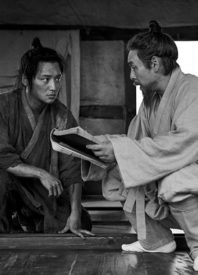
The magistrates working for the new Jeoson King in 1801 decided to execute everyone they suspect of studying Christianity. One of those suspected Christians is Chung Yak-jeon. The magistrates decide that they’re high profile enough that instead of execution, the brothers should face exile. Yak-jeon, both a student of Confucianism and Christianity, is nice enough to the townsfolk of the island where he’s facing exile. However, he still has his prejudices, which he expresses on Chang-dae, (Byun Yo-han) a nobleman’s illegitimate son working as a fisherman. But those prejudices disappear when he learns of Chang-dae’s abilities as an autodidact. Yak-jeon’s brother writes many books about government, but he sees something deeper about Chang-dae’s knowledge, which includes marine life. So he shifts from his brother and writes the ambitious titular Book of Fish while living with a local woman (Parasite‘s Lee Jung-eun), and he sees her intellectual potential as well.
This new film is painterly, which comes with black and white films. Ones that feel like it chooses that cinematography to hide something or as a shortcut for viewers to take it more seriously. This can feel unnecessary. It’s also a deep text, and some of the political intrigue matches with what happened as the consequences of the change of policy in 1801. Anyone who has access to Wikipedia, though, can search for valid historical inaccuracies. This can suspend total disbelief while watching the film. And of course, there’s the ebb and flow that comes with the arc of tensions between Yak-jeon and Chang-dae that feels trope-y. But it’s actually interesting to watch their stories as both characters diverge and possibly reunite. These later scenes are also ones where Byun Yo-han shine. He transforms as a man and a husband to Bok-rae (Min Do-hee) and that subplot is great.
- Release Date: 8/21/2021

